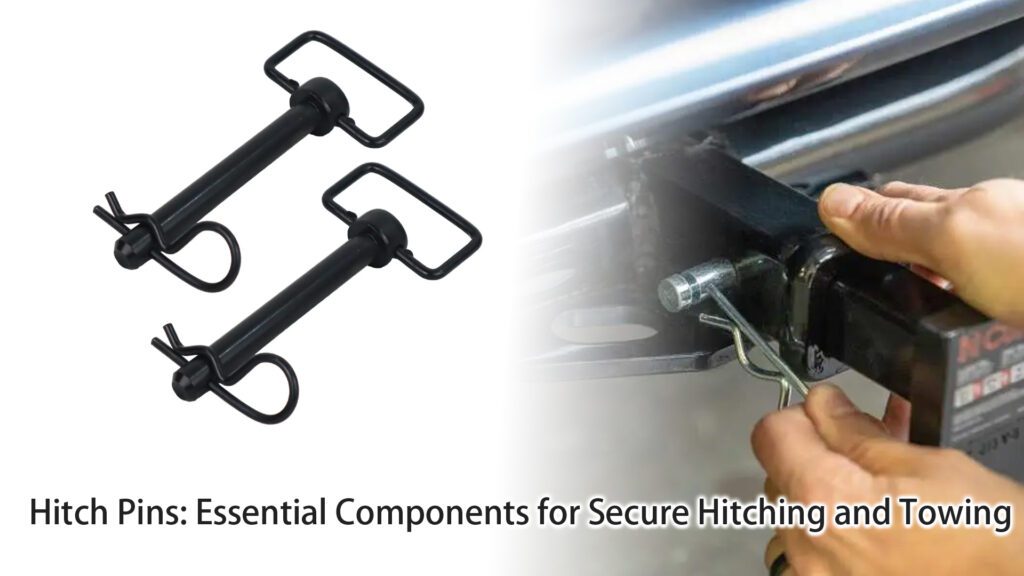Hitch pins are crucial components that ensure the secure attachment of trailers, agricultural equipment, and other towed machinery to vehicles. These small yet vital fasteners play a significant role in various industries, from construction to recreational towing. In this article, we’ll explore the types of hitch pins available, their key features, and how to choose the right one for your needs.
What Are Hitch Pins?
Hitch pins are sturdy metal fasteners designed to hold a trailer or implement securely to a vehicle’s hitch. By inserting the pin through a hole in the hitch and locking it in place, these pins prevent accidental detachment while towing. Used across various industries, including agriculture, automotive, and construction, hitch pins are indispensable for safe and reliable towing.
Types of Hitch Pins
You’ll find several types of hitch pins, each designed for specific tasks. Here are the most common types:
- Standard Hitch Pin
- A simple, straight pin, the standard hitch pin fits through a hole in the hitch and secures with a cotter pin or another locking mechanism. These pins are perfect for light-duty towing applications and are easy to use.
- Clip Hitch Pin
- Featuring a spring-loaded clip, the clip hitch pin automatically locks into place once inserted. This design allows for quick attachment and detachment, making it ideal for users who need to connect and disconnect towing equipment frequently.
- Locking Hitch Pin
- Locking hitch pins incorporate a built-in lock to prevent theft. These pins are especially useful for securing trailers or towed equipment in public or high-risk areas. Various locking mechanisms, such as key-operated or combination locks, ensure extra protection.
- T-Hitch Pin
- With a “T” shape at the end, T-hitch pins offer additional leverage for easier insertion and removal, making them suitable for heavier-duty towing applications or tight spaces.
- Greaseable Hitch Pin
- Greaseable hitch pins come with a built-in grease fitting. These pins are ideal for harsh outdoor environments, as they resist rust and corrosion and ensure smooth operation.
Key Features of Hitch Pins
When choosing a hitch pin, consider the following features to ensure you select the best one for your needs:
- Material:
- Hitch pins are typically made of durable steel or stainless steel, ensuring they provide the necessary strength and resistance to corrosion. Stainless steel is particularly useful in marine or coastal environments because it resists rust and corrosion.
- Size and Compatibility:
- Hitch pins come in different sizes to match various hitch designs. Be sure to choose a pin that fits the hole in your hitch and is rated for the weight of the load you’re towing.
- Ease of Use:
- Some hitch pins feature ergonomic handles or spring-loaded clips that make them easy to insert and remove, even in challenging conditions.
- Safety Features:
- Many hitch pins include safety clips, pins, or locks to keep the pin securely in place during towing. These safety features prevent accidental detachment and improve overall towing security.
How to Use a Hitch Pin Properly
To ensure the safety of your towing operation, follow these tips when using a hitch pin:
- Check for Proper Fit:
- Ensure that the hitch pin fits snugly through the hitch’s hole. A properly fitting pin will slide through without too much play, providing a secure connection.
- Secure the Pin:
- Always secure the hitch pin with a cotter pin, clip, or lock, depending on the type of pin you use. For locking pins, verify that the lock is fully engaged before you begin towing.
- Inspect Regularly:
- Periodically inspect the hitch pin for signs of wear, rust, or bending. Replace any damaged or worn pins to maintain the safety of your towing setup.
- Lubricate When Necessary:
- If you’re using a greaseable hitch pin, make sure to lubricate it regularly. This will prevent rust and ensure smooth operation, especially in outdoor conditions.
Applications of Hitch Pins
Hitch pins serve a wide range of purposes across different industries. Here are some common applications:
- Trailer Towing:
- Hitch pins are most commonly used to secure trailers to towing vehicles. Whether you’re hauling cargo, livestock, or recreational vehicles, hitch pins ensure a strong and secure connection between the vehicle and trailer.
- Agricultural Equipment:
- In farming, hitch pins attach implements such as plows and trailers to tractors. These pins need to handle heavy loads and endure harsh weather conditions, making durability essential.
- Construction Equipment:
- Hitch pins also secure construction equipment to towing vehicles, ensuring that heavy machinery stays attached even under tough working conditions.
- Recreational Vehicles:
- For those who enjoy recreational towing, hitch pins are crucial for safely attaching trailers, bike racks, and RVs to vehicles. Quick-release or locking pins are often preferred in these situations to ensure convenience and security.
Conclusion
Hitch pins are essential for secure towing and transporting equipment. By understanding the different types of hitch pins and their key features, you can make an informed choice about which pin is best suited for your needs. Whether you’re towing a trailer, agricultural equipment, or recreational vehicle, selecting the right hitch pin ensures a safe and reliable connection.
If you are not sure which hook pin to choose, you can ask Hengsheng Spring for help. We have professional engineers who will solve the problem for you.

